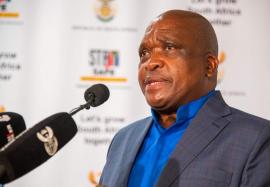
While millions of South Africans leave healthcare facilities satisfied, Health Minister, Dr Joe Phaahla, acknowledged that there are still “unfortunate” events that leave much to be desired.
“I cannot speak to an audience in the Eastern Cape province without thinking about the young woman who lost her life after she sought care from one of our primary healthcare facilities after a sexual assault.
“This is despite the presence of a good tool such as the Adult Primary Care Model, which clearly explains how someone who has been sexually assaulted needs to be managed,” he said.
Phaahla believes that this incident and others across South Africa point to the fact that more attention needs to be paid to training, supervision, and progressive discipline.
The Minister was speaking on Wednesday at the South African Primary Health Care (SAPHC) two-day conference in East London, in the Eastern Cape.
He told delegates that another area that needs strengthening in primary health care services is the Environmental Health Programme.
“If we are to continue our good track record when it comes to the prevention, early detection and management of waterborne and foodborne illnesses, as well as the harm that could come from air pollution, we need to increase the number of environmental health officers that are appointed by municipalities.”
Phaahla also touched on the security services at primary healthcare and other facilities, which he said have become a costly challenge.
“When our facilities are not properly guarded and secured it becomes stressful for health workers to perform their duties,” he added.
Strengthening healthcare
To give effect to the realisation of the Sustainable Development Goals, Phaahla said the National Development Plan 2030 re-affirmed the country’s commitment to strengthening the primary health care approach at community level.
“There is no better time than now for South Africa, Africa, and the world to implement Universal Health Coverage to strengthen health systems.”
However, inequity remains the biggest challenge to the health system and threatens the sustainability of healthcare for everyone in the country.
“Expenditure on health in the private sector remains unabated while the public sector allocations are reduced, thus widening the inequity.”
He said government together with stakeholders and partners strive to facilitate, for all South Africans a socially and economically productive life.
“We believe that primary health care is the key to attaining this target.”
He said district health systems have set up services spanning from community level to primary healthcare services in mobile clinics, clinics and community health centres and to higher levels of hospital care if required.
In the past 15 years, there has been a significant growth in the number of people who use primary healthcare services as the country recorded 120 million visits to primary health care facilities in 2013.
“The facilities were under extreme pressure because of this good attendance by our communities and the need for the Central Chronic Medicines Dispensing and Distribution programme was recognised.”
In line with the 2018 Astana Declaration on primary healthcare, South Africa will increase the capacity-building of all health and support research and share knowledge and experience while learning from each other as provinces.
He also said the country needs to take on board good practices from other countries. – SAnews.gov.za


